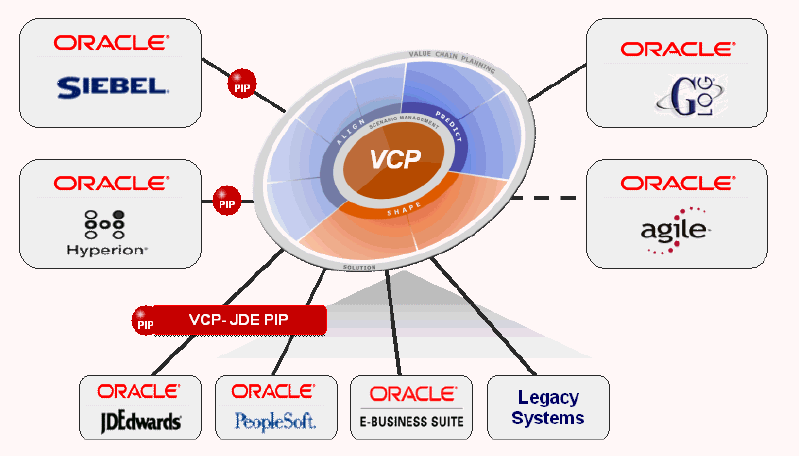Overview of Value Chain Planning Suite
This chapter covers the following topics:
- Overview
- Naming Conventions
- Value Chain Planning Suite Applications
- Value Chain Planning Integration
Overview
To deal with the challenges of today's global economy, companies need to transform their supply chains into information-driven value chains. Successful planning relies on the speed of decision making and continuous monitoring of the impact of those decisions at all levels in the organization. Oracle Value Chain Planning enables best in class processes such as demand sensing, shaping for profitability, fast event-driven scenario simulation, supply chain risk management, sales and operations and integrated business planning, comprehensive trade management, integrated order orchestration and promising, and multi-enterprise planning and collaboration. Oracle Value Chain Planning is a complete planning solution built on a common foundation that leverages pre-built integration with both Oracle (E-Business Suite, and JD Edwards EnterpriseOne) and non-Oracle systems and can be deployed in a modular approach to save time and cost.
Naming Conventions
While Value Chain Planning is the current name of this suite of products, it has gone by different names in the past such as Advanced Planning (AP), Advanced Planning Solutions (APS), Supply Chain Planning (SCP), and sometimes Advanced Supply Chain Planning (ASCP), which is a key component of the Value Chain Planning suite. Some of this naming is still present in program names and options. When referred to generally, the name "Value Chain Planning" will be used. When a specific program is being referred to, the actual name will be used, even if it is old terminology such as APS Partitions.
Value Chain Planning Suite Applications
The Oracle Value Chain Planning suite includes the following products:
-
Oracle Advanced Planning Command Centre (APCC)
-
Oracle Advanced Supply Chain Planning (ASCP)
-
Oracle Collaborative Planning
-
Oracle Demand Planning
-
Oracle Demand Signal Repository
-
Oracle Demantra Demand Management and Advanced Forecasting
-
Oracle Demantra Sales and Operations Planning
-
Oracle Demantra Predictive Trade Planning and Optimization
-
Oracle Demantra Deductions and Settlement Management
-
Oracle Global Order Promising
-
Oracle Inventory Optimization
-
Oracle Production Scheduling
-
Oracle Rapid Planning
-
Oracle Service Parts Planning
-
Oracle Strategic Network Optimization
The following graphic shows their relationship and role in Value Chain Planning:

Value Chain Planning Integration
The Value Chain Planning suite leverages pre-built integrations with both Oracle (EBS, JD Edwards, Peoplesoft, Siebel and Hyperion) and non-Oracle ERP and legacy systems. The pre-built integrations with Oracle applications are called Process Integration Packs (PIPs). Oracle's Application Integration Architecture (AIA) makes use of the Oracle Data Integrator (ODI) to transfer and transform data from one application to another according to the PIP.
For most integrations, the VCP collections process is the critical process required to make a subset of EBS data available for planning purposes with other VCP products as well as other ERP systems. The following diagram shows the integrations available between VCP and non-EBS systems:

For documentation about all Value Chain Planning integrations, please see Note #1125094.1, "Value Chain Planning Integration Documentation Library".
For information about integrating with legacy systems, please see Collecting from Legacy Systems.